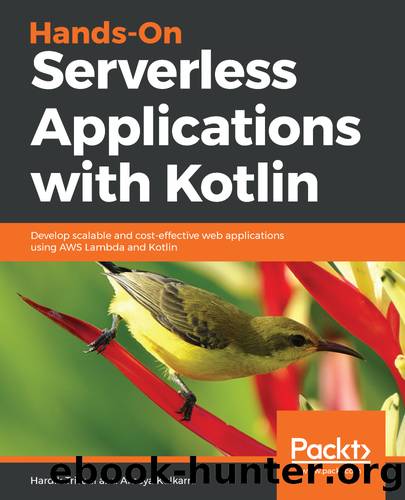Hands-On Serverless Applications with Kotlin by Hardik Trivedi

Author:Hardik Trivedi [Hardik Trivedi]
Language: eng
Format: epub
Publisher: Packt Publishing
Published: 2018-09-28T16:30:38+00:00
Lambda functions
One of the top-selling points of Kotlin is that it supports a function as a type. This means functions can be saved/held as an object or can be passed as a parameter, just like an object. You can think of lambda functions as functions without a name. We used to call them anonymous functions. Kotlin's lambda functions are similar to Java's lambda functions.
They are very useful. They save us a lot of time by not writing specific functions in an abstract class or an interface.
For example, a button's onClick event is one of the boring and stereotype works in Android. But Kotlin does it using lambdas:
createPollButton.setOnClickListener {
presenter.createPoll(pollTitle.text.toString(), pollQuestion.text.toString(), getSharedPreferences(getString(R.string.app_name), Context.MODE_PRIVATE).getString("userId", ""))
}
Let's say you want to write a function that adds two numbers but in a lambda style. The code can be written as follows:
val sum = { num1: Int, num2: Int -> num1 + num2 }
And we can call the preceding function using the following code:
val sumAns=sum(10,20)
The val sum just looks like a property, but it's actually a function. Many developers also use invoke functions, which trigger the lambda function. Using invoke, the same code can be rewritten like:
val sumAns=sum.invoke(10,20)
Download
This site does not store any files on its server. We only index and link to content provided by other sites. Please contact the content providers to delete copyright contents if any and email us, we'll remove relevant links or contents immediately.
Exploring Deepfakes by Bryan Lyon and Matt Tora(8367)
Robo-Advisor with Python by Aki Ranin(8309)
Offensive Shellcode from Scratch by Rishalin Pillay(6428)
Microsoft 365 and SharePoint Online Cookbook by Gaurav Mahajan Sudeep Ghatak Nate Chamberlain Scott Brewster(5678)
Ego Is the Enemy by Ryan Holiday(5413)
Management Strategies for the Cloud Revolution: How Cloud Computing Is Transforming Business and Why You Can't Afford to Be Left Behind by Charles Babcock(4563)
Python for ArcGIS Pro by Silas Toms Bill Parker(4503)
Machine Learning at Scale with H2O by Gregory Keys | David Whiting(4292)
Elevating React Web Development with Gatsby by Samuel Larsen-Disney(4224)
Liar's Poker by Michael Lewis(3441)
Learning C# by Developing Games with Unity 2021 by Harrison Ferrone(3350)
Speed Up Your Python with Rust by Maxwell Flitton(3310)
OPNsense Beginner to Professional by Julio Cesar Bueno de Camargo(3283)
Extreme DAX by Michiel Rozema & Henk Vlootman(3263)
Agile Security Operations by Hinne Hettema(3190)
Linux Command Line and Shell Scripting Techniques by Vedran Dakic and Jasmin Redzepagic(3172)
Essential Cryptography for JavaScript Developers by Alessandro Segala(3144)
Cryptography Algorithms by Massimo Bertaccini(3084)
AI-Powered Commerce by Andy Pandharikar & Frederik Bussler(3052)
